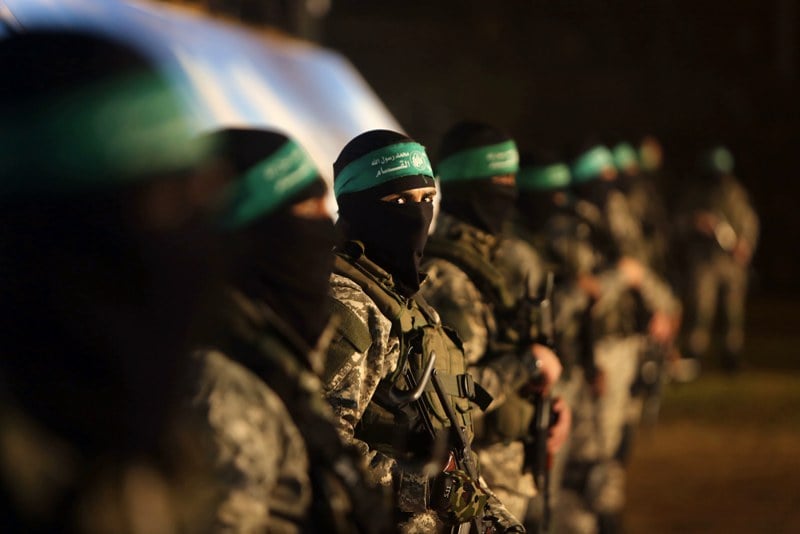A message on the phone invites its holder for a “cup of coffee,” a meeting among the rubble, and handing over cash… This is how the Islamic Resistance Movement “Hamas” continues to pay its employees’ salaries in Gaza despite two years of war, in a “deathly risky” operation, according to one of them.
Israel has launched severe strikes against Hamas, its government, and institutions since the war began 23 months ago, weakening the movement that has ruled the Gaza Strip since 2007, causing liquidity shortages and declining capabilities. However, testimonies collected by AFP from several government employees, all using pseudonyms, confirm they still receive salaries, or part of them, from Hamas.
Kareem (39), an employee at the Ministry of Public Works under the Hamas government, said he received a message in July on his mobile phone saying, “So-and-so (name not specified)… invites you for a cup of coffee” with the time and place near a school turned into a shelter for displaced people in an undisclosed area.
He added: “I went to the specified place. I was very afraid of an Israeli airstrike. There, an employee I knew was waiting for me. He handed me 1000 shekels ($298),” a partial payment of his monthly salary, which was 2900 shekels before the war.
He describes the salary delivery process as “deathly risky.”
Residents in Gaza told AFP by phone they fear being near people affiliated with Hamas or working or fighting with it, as Israel can track many of them and often targets them with airstrikes or drones, causing deaths of those around them.
Alaa, a teacher at a government school in Gaza City, said the last salary she received was in June.
That day, she received a text message asking her to go to a displaced persons’ school in the northern Gaza Strip.
The thirty-year-old woman, married with five children, said, “The school had just been hit by an Israeli strike, and the employee delivering salaries fled. Thank God I was late and escaped death.”
She returned the next day to receive her salary.
Before the war, Hamas relied on revenues from customs duties and taxes covering all life sectors to prepare its government budget: income taxes, fees on trade, municipal services, government transactions, etc.
Since 2021, Qatar has been sending monthly sums to Gaza (amounting to $360 million per year even before the outbreak of war on October 7, 2023), under ceasefire agreements it brokered between Hamas and Israel to avoid escalation and to secure employees’ salaries and help the poor in the Palestinian territory.
It is also known that Hamas relied on financial support from many undisclosed sources.
Reports indicate Hamas receives financial and military support from Iran; however, the Islamic Republic confirms only its political support for the movement without confirming arms or money supplies.
A Palestinian official familiar with Gaza said Hamas obtained funds through complex and secretive means, including smuggling via border tunnels or by sea.
Hamas keeps its funding sources and provision mechanisms secret. A senior member said it is a “national security issue, part of the resistance.”
Jamil (43), an accountant at a government institution in Gaza, said Hamas “stored hundreds of millions of dollars either in tunnels or safe places for tough times like war,” without further details.
He noted that Israel “bombed Hamas-affiliated banks and many places with money stores and assassinated several financial officials, but this did not stop the process.”
Israel destroyed all Hamas institutions in the Strip, including branches of two banks established after Hamas took control in 2007, which the Palestinian Monetary Authority does not recognize: the Production Bank and the Islamic National Bank.
In February 2024, the Israeli army released videos showing boxes and bags containing large sums of money in shekels, dollars, and Jordanian dinars, found in a tunnel.
The Israeli army carried out strikes targeting officials accused of managing Hamas funds, including a senior official named Ismail Brhoum, whom the army announced was killed in March.
AFP testimonies indicate Israel targeted dozens of salary delivery points in the devastated Strip, some causing fatalities.
Some senior employees receive their salaries secretly at their residences in displaced persons camps or shelters “to avoid Israeli strikes,” according to a Hamas source.
Jamil explained that the salary payment process is “very complicated and the payment plan changes constantly depending on the security situation,” emphasizing the government’s keenness to pay part of the salaries whenever funds are available.
According to a Hamas official in Doha, the movement “spares no effort to provide salaries,” considering the occupation’s claim that it has eliminated Hamas as “an illusion.”
There are 40,000 government employees in Gaza. It is unknown if all receive their salaries regularly. Some complain that those “affiliated” with Hamas receive money and aid while others do not. A small number of employees in health and police sectors still work, while work has stopped for others due to the war.
Those still receiving full or partial salaries say it is insufficient amid deteriorating conditions in the Strip, where food prices have risen sharply and there is a shortage of essentials.
Kareem, who supports his wife and six children, said: “I feel oppressed, the salary is not enough to provide flour for a week, famine and astronomical prices in the markets.”
Masoud recently received a text message on his wife’s phone inviting him to drink tea; his wife was surprised by the message, but he laughed and told her: “This is good news, the salary has arrived.”
Masoud, a Hamas police officer, explained that the salary “does not fatten or satisfy hunger; we barely provide some flour, receiving part of it every two or three months.”
While affirming “we are with the resistance,” he noted, “It would have been better if Hamas had prepared for these hellish moments. How do you ask people to endure without food or water?”
He added: “I don’t want a salary or a job; I want the war to end and to live a human life.”
Abdullah (38), a teacher in northern Gaza, said, “I said goodbye to my wife and children without telling them I was going to receive my salary.”
He supports his mother and more than twenty people, including the wives and children of his three brothers who were killed near aid distribution centers.
Abdullah received his last salary (950 shekels, about $280) in July. He highlighted that the payment method is “tiring, as if you work in a mafia.”













Recommended for you
Talib Al-Rifai Chronicles Kuwaiti Art Heritage in "Doukhi.. Tasaseem Al-Saba"
Exhibition City Completes About 80% of Preparations for the Damascus International Fair Launch
Unified Admission Applications Start Tuesday with 640 Students to be Accepted in Medicine
Egypt Post: We Have Over 10 Million Customers in Savings Accounts and Offer Daily, Monthly, and Annual Returns
His Highness Sheikh Isa bin Salman bin Hamad Al Khalifa Receives the United States Ambassador to the Kingdom of Bahrain
Al-Jaghbeer: The Industrial Sector Leads Economic Growth